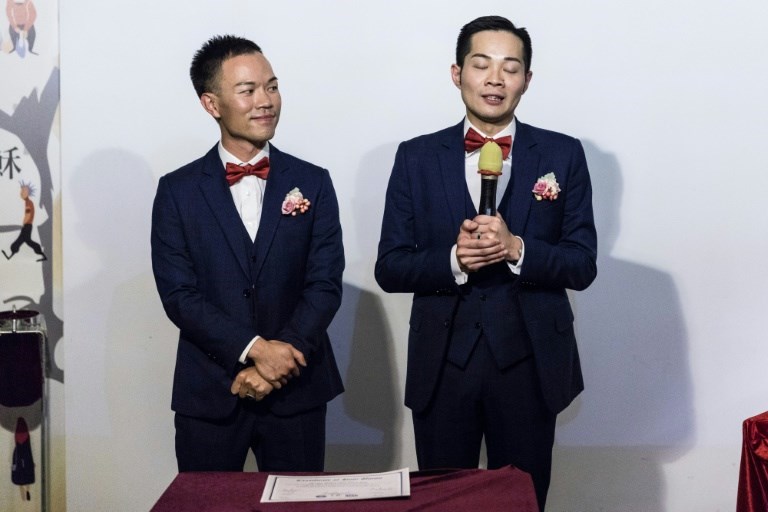It was a day Alvin Chan and his partner C.P. So had never imagined possible -- tying the knot in front of cheering family and friends in Hong Kong.
Apprehensive about holding a wedding ceremony in the socially conservative city a year after they signed marriage papers in Britain, Chan and So were finally convinced by their pastor to hold a small-scale celebration.
But like many other gay weddings in Hong Kong, it was held behind closed doors, tucked away in a commercial space in the fashionable district of Sheung Wan.
Same-sex marriage is not legally recognised in Hong Kong and often those who have a ceremony say they prefer to do it privately, away from the public gaze.
Some family members will stay away, or more commonly are not told at all.
"It's quite sad," says Chan, whose siblings attended the wedding but parents did not.
"When you decide to get married, you really want to receive your family's blessing but they have a traditional mindset, which is regrettable," he told AFP.
So and Chan, both aged 34, say that their Christian upbringings made them feel they had to keep their sexual identities and their relationship a secret.
So came out to his parents in 2004 but Chan says he still is not comfortable enough to do so himself, but has now found the courage to speak out about it to others.
Their pastor, Joe Pang, 37, who is also gay, has been trying to enable same-sex couples like them to enjoy a wedding celebration in Hong Kong, despite the pressures and prejudices.
It was he who officiated at the ceremony, where the couple wore matching blue suits and red bow ties, exchanged rings and kissed, cementing seven years together.
Pang belongs to the Hong Kong-based Blessed Ministry Community church, which he describes as Asia's first gay-friendly Christian group.
He issues marriage certificates recognised by some Christian groups and says he wants to ensure LGBT people feel equal in society.
"The road they've walked has been difficult, and I think society has a responsibility to listen to gay people," he told AFP.
- Role models -
Pang says he has married more than 50 gay couples in Hong Kong, now conducting one or two same-sex weddings each month, up from just one in 2015.
Homosexuality was only decriminalised in Hong Kong in 1991, and despite a vibrant gay scene and an annual pride parade, conservative attitudes still run deep in Chinese traditions.
Outlawing discrimination based on sexual orientation has been proposed in the city's legislature, but is yet to materialise.
The Hong Kong government is currently appealing a landmark court decision to grant a British lesbian the spousal right to live and work in the territory.
Taiwan last year became the first country in the region to allow legal recognition for same-sex marriages, but critics say Hong Kong is a long way behind.
"Our government doesn't want any change," said Hong Kong's first openly gay lawmaker Ray Chan at a weekend rally ahead of International Day Against Homophobia, Transphobia and Biphobia (IDAHOT), celebrated globally on May 17 to raise awareness of LGBT rights.
"Unless they lose a legal battle -- until the very end, at the court of final appeal -- only then will they make concessions," he said.
Roger Wong, an outspoken anti-LGBT activist says the government has no reason to give legal recognition to gay marriage or help LGBT people unless the public supports it.
"Gay marriage should only happen if 100 percent of the general public accepts it," Wong told AFP.
"I really don't think it will happen."
So and Chan say they feel society is changing, but that there is a long way to go before members of the LGBT community feel safe to celebrate same-sex relationships openly in public.
Chan says LGBT people need to come out to their family and the public "to show them that gay people exist" if they are to gain acceptance in future.
So and Chan say getting married was not just a special day for them, but was also about being role models.
"Hong Kong, because of its Christian values or traditional mindset, is going back from becoming a more free society," said Chan.
"We just want to show other people that it's okay to come out as gay."



